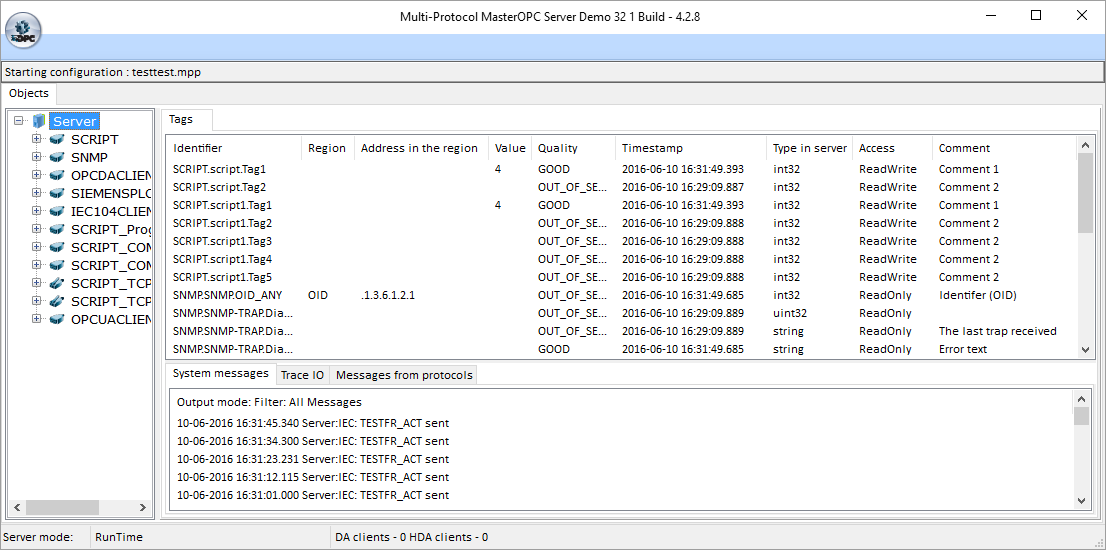Run-Time Interface
The screenshot below demonstrates what the server window looks like in the run-time mode:

Below the window title bar, a start configuration filename is displayed (see The ‘Configuration File’ Menu ). The following tabs are situated below:
![]() Objects – an object tree of the start configuration (see Hierarchy of Tree Objects )
Objects – an object tree of the start configuration (see Hierarchy of Tree Objects )
![]() Tags – parameters of tags of the highlighted tree object (the parameters Region and Address in the region are defined in the plugin)
Tags – parameters of tags of the highlighted tree object (the parameters Region and Address in the region are defined in the plugin)
![]() System messages – this tab displays system messages (system start, system stop, opening of ports and sockets, etc.; these messages can be written to the server log – see description of the Information messages flag in The Dialog of Server Parameters ).
System messages – this tab displays system messages (system start, system stop, opening of ports and sockets, etc.; these messages can be written to the server log – see description of the Information messages flag in The Dialog of Server Parameters ).

![]() Trace IO – this tab displays bytes directed to ports/sockets or received from ports/sockets; these messages can be written to the server log – see description of the Command queries flag in The Dialog of Server Parameters .
Trace IO – this tab displays bytes directed to ports/sockets or received from ports/sockets; these messages can be written to the server log – see description of the Command queries flag in The Dialog of Server Parameters .

![]() Messages from protocols – this tab displays messages generated:
Messages from protocols – this tab displays messages generated:
![]() In a script – by the function server.Message (such messages can be written to the server log – see description of the Script messages flag in The Dialog of Server Parameters ).
In a script – by the function server.Message (such messages can be written to the server log – see description of the Script messages flag in The Dialog of Server Parameters ).
![]() In a protocol – by the function mps_message or mps_DebugMessage (see The Function to Create a Debug Message ) (such messages can be written to the server log – see description of the Debug messages flag in The Dialog of Device Parameters ).
In a protocol – by the function mps_message or mps_DebugMessage (see The Function to Create a Debug Message ) (such messages can be written to the server log – see description of the Debug messages flag in The Dialog of Device Parameters ).

![]() HDA:<tag name> – this tab displays an HDA archive of the tag highlighted in the tree (the tab is not displayed if HDA access = FALSE for the tag; see The Dialog of Tag Parameters ):
HDA:<tag name> – this tab displays an HDA archive of the tag highlighted in the tree (the tab is not displayed if HDA access = FALSE for the tag; see The Dialog of Tag Parameters ):

The status bar in the bottom part displays:
![]() A server mode: RunTime (the run-time mode) or Design time (the design-time mode)
A server mode: RunTime (the run-time mode) or Design time (the design-time mode)
![]() Number of DA clients connected
Number of DA clients connected
![]() Number of HDA clients connected
Number of HDA clients connected
When switching to the run-time mode, the upper part of the Multi-Protocol MasterOPC Server shell displays information about connecting the built-in OPC UA server (if such a connection is configured, that is, if Connection=TRUE in the OPCUA Server section of The Dialog of Server Parameters ):
